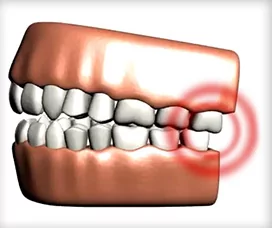Casper, Douglas, and Central Wyoming’s Specialists in TMJ Headache Relief

Wish you could be free from painful headaches? Have you asked your dentist about TMJ treatment for headache relief? Many times, migraines and chronic headaches can be caused by TMD, a condition in the jaw joints.
TMJ Disorder
The temporomandibular joints, or the TMJ, are the joints and jaw muscles located on either side of the head that control jaw movement. The movement of the jaw incorporates muscles, ligaments, and the bone itself that work in harmony to allow you to chew and speak.
Any issue that hinders the ball and socket of the TMJ can lead to TMJ disorder (TMD). Diagnosis is the first step to headache relief.
Symptoms of TMD
Some patients visit various specialists to determine the cause of their head pain and other symptoms, such as:
- Jaw pain
- Clicking in the jaw
- Limited jaw movement
- Tired facial muscles
- Pain in the neck, shoulders, and back
- Ringing or buzzing in the ears
All of these symptoms point to TMJ disorder, or TMD.
TMJ Mouthguard Therapy
At Aspen Ridge Dental in Casper, our preferred TMJ treatment is with mouthguard therapy. The TMJ mouthguard is a small device fashioned to fit over your upper teeth, protecting them from wear. The appliance can also reposition the lower jaw.
Overall, mouthguard TMJ treatment works to relax the TMJ muscles and provide headache relief. While simple, TMJ mouthguard therapy is an effective solution to TMD and can eliminate all of its symptoms.

This TMJ treatment method is:
- Small and portable
- Easy to clean
- Highly effective
Other treatments may include TMJ massage, exercise, bite adjustments, or surgical intervention. Often, bite guard therapy is all that is required to restore your health and comfort.
Causes of TMD
The exact cause of TMD is not always clear, and there may be a combination of factors that contribute to its development:
- Bruxism: One of the most common causes of TMD is bruxism, which is the grinding and clenching of teeth. This puts a lot of pressure on the jaw joint and can lead to muscle tension and pain.
- Injury or Medical Conditions: Other factors that can cause TMD include trauma or injury to the jaw, arthritis, stress, and certain medical conditions like fibromyalgia.
- Orthodontic Issues: TMD can also be caused by an uneven bite or malocclusion, which means that the teeth do not align properly. This can lead to a misalignment of the jaw joint, which can cause pain and discomfort.
- Poor Posture: Another potential cause of TMD is poor posture. This is because the muscles in the neck and upper back are connected to the muscles in the jaw, and poor posture can lead to tension and strain in these muscles. This tension can then be transferred to the jaw joint and contribute to TMD.
Overall, the causes of TMD are complex and caused by many things. A comprehensive evaluation by a dental professional is necessary to determine the underlying cause of the condition.
What Is Bruxism?
Bruxism is a common condition where individuals grind or clench their teeth unconsciously. This can lead to a variety of dental issues, including worn or cracked teeth, headaches, and jaw pain, which can ultimately result in temporomandibular joint disorders (TMD).
The excessive force applied to the jaw muscles and joints can cause inflammation and damage to the TMJ, which connects the jawbone to the skull. Over time, this can result in chronic pain and dysfunction of the jaw.
If you have bruxism and want to prevent TMD, here are some tips you can follow:
- Identify and manage stress levels.
- Try meditation and other relaxation techniques.
- Limit consumption of alcohol, caffeine, and nicotine.
- Use a dentist-prescribed mouthguard at night.
TMJ Treatment FAQs
What is TMJ Treatment?
TMJ treatment refers to therapies aimed at addressing temporomandibular joint (TMJ) disorders, which affect the jaw joint and surrounding muscles. These treatments aim to alleviate pain, improve jaw function, and restore comfort to patients experiencing TMJ-related symptoms.
What are Common Symptoms of TMJ Disorders?
Common symptoms of TMJ disorders include jaw pain or tenderness, difficulty or discomfort when chewing, clicking or popping sounds when opening or closing the mouth, headaches, earaches, facial pain, and jaw muscle stiffness. If you are experiencing any of these symptoms, it’s essential to consult with a dentist experienced in TMJ treatment for an accurate diagnosis and appropriate management.
How Can TMJ Treatment Provide Headache Relief?
TMJ treatment can provide headache relief by addressing the underlying causes of TMJ disorders, which often contribute to headaches and migraines. By alleviating jaw muscle tension, reducing inflammation in the TMJ, and improving jaw alignment, TMJ treatment can help alleviate the strain on surrounding muscles and nerves, thus reducing headache frequency and intensity.
Can a TMJ Mouth Guard Help with TMJ Treatment?
Yes, a TMJ mouth guard, also known as an occlusal splint or bite guard, can be an effective component of TMJ treatment. These custom-fitted oral appliances are designed to reposition the jaw, reduce teeth grinding or clenching (bruxism), and provide cushioning and support to the TMJ. By wearing a TMJ mouth guard, patients can alleviate jaw pain, prevent further TMJ damage, and improve overall jaw function, leading to enhanced comfort and quality of life.
Find TMJ Pain Relief With Aspen Ridge Dental
Only your dental professional can fabricate, fit, and monitor your bite guard. If you or your loved one is experiencing any of the signs and symptoms of TMD, we would be happy to consult with you at Aspen Ridge Dental. We serve patients throughout Central Wyoming, including Casper and Douglas. Call us at 307-234-6054 and schedule an appointment today!
Get Your TMJ Treatment Questions Answered – Contact Us Today!
